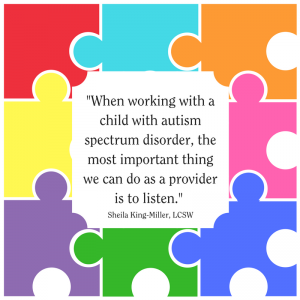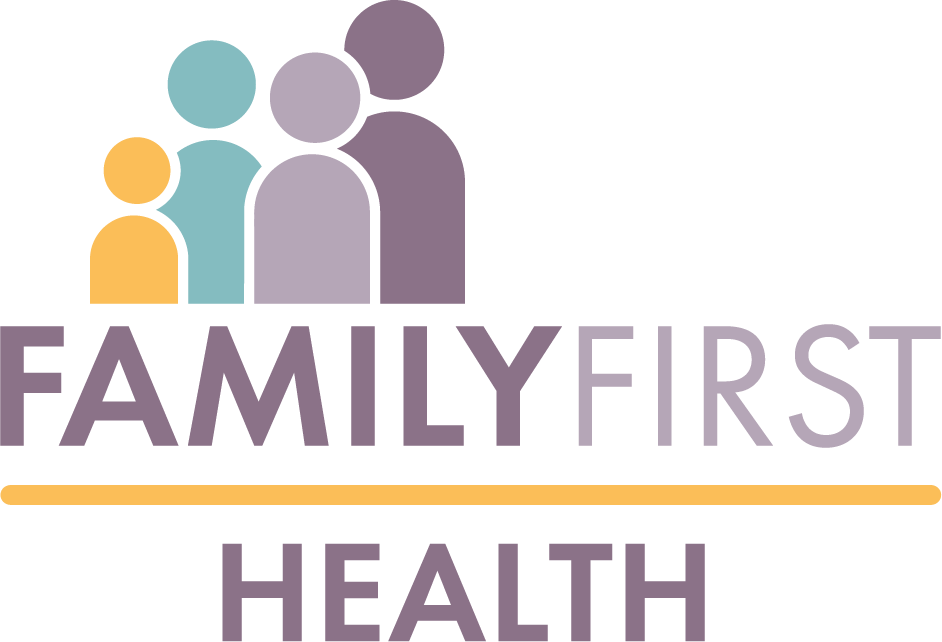Four-year-old William reads at a second-grade level. He is very creative and loves looking at and collecting logos. Liam loves animals and is a great listener for anyone who needs a friend. Gideon loves life, constantly has a smile on his face, and has an aura of happiness that seems to draw people in. These amazing individuals also have autism spectrum disorder (ASD).
We have touched on the fact that ASD is incredibly different for each person diagnosed, but what does this mean for the families of children with ASD, and what can others do to help support them? Family First Health, behavioral health consultant Sheila King-Miller, LCSW, states that “When working with a child with ASD, the most important thing we can do as a provider is to listen. Listen to the child through their words and their behaviors. Listen to the parent/caregiver through their words, behaviors and interactions.” Communication and the way we communicate to a person with ASD is integral and best known by those closest to them. While some individuals with ASD have problems communicating or are even nonverbal, that does not mean they cannot communicate. To overcome these issues Rebecca Anhorn notes that it is best not to label the child as disabled, rather emphasize that they learn differently and focus on their strengths.

If you know an individual with a diagnosis of ASD the best thing to do is be supportive of the family by asking them what they need. Jennifer Beamer shares, “[We] face the constant barrage of unwanted advice from well-meaning friends and family that don’t really understand ASD…. we just want their support instead of, ‘Why haven’t you tried this or why don’t you just make him do it?’” The truth is, no one really understands all aspects of ASD, but for parents of a child with ASD they will know best what works or what will not. We hear the same word repeatedly from the families of individuals with ASD, especially those with children – advocate. When talking about her son Gideon, Rebecca Anhorn emphasizes, “Through every developmental stage, understanding the needs and challenges your child faces and being strong to advocate for them appropriately.” It is just as important for the parents and families of children with ASD to care for themselves. Being a parent of a child with ASD can be just as draining as it is energizing and Rebecca notes the importance of being patient and taking time to rejuvenate.
The best way to support a family touched by ASD is to ask what they need and to get to know the individual with ASD. At the same time, for those families that are struggling, reach out and ask for assistance, there is a wide world of people out there that are going through what you are and are willing to help. Talk to your friends, neighbors, medical providers, teachers, behavioral health specialists, social workers, and friends to get the assistance you need to support both yourself and your family member with ASD.
For all the parents out there that have a child with ASD, please take these words of wisdom from some amazing mothers who have been there:
“Continue to be the best positive role model for your child…Never give up and know you are most definitely not alone!” – Deirdre Ward
“You are your child’s best advocate. If you feel that something isn’t right, fight for your child.” – Jennifer Beamer
“I would tell a mom whose child is recently diagnosed that it is not an end to anything but the beginning of a different but amazing life…take each day as it comes and appreciate the little things that your child brings into your life.” – Rebecca Anhorn
“It’s not the end of the world. Your child needs you to not treat them any differently. Expect them to handle everything they physically and mentally can and they will grow up more independent than you may think.” Jennifer Johnpoll
A very special thank you to an incredible group of women Rebecca Anhorn, Jennifer Beamer, Jennifer Johnpoll, and Deirdre Ward for their input, and to their amazing children with ASD.
